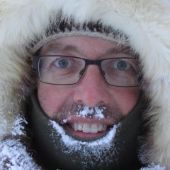Contact
Professor, Augustana - Social Sciences
- morten.asfeldt@ualberta.ca
- Phone
- (780) 679-1158
- Address
-
2-300 Faith & Life Centre
4901-46 AveCamrose ABT4V 2R3
Overview
Area of Study / Keywords
Program: Physical Education Program: Elementary Education
About
My home within the University of Alberta is in the Augustana Faculty in Camrose, an undergraduate liberal arts and sciences faculty. During my academic career, I have developed many international teaching and research connections and collaborations most notably in Scandinavia, the UK, and Japan. I grew-up in northern Canada (Newfoundland and Yukon) and have spent the last 30 years traveling by canoe, raft, foot, snowshoe, and dogsled to many parts of the NWT and Nunavut. One of the most gratifying aspects of my academic career has been sharing my love and knowledge of the north with students and colleagues from around the world.
Research
My research and teaching are tightly interwoven. My research explores questions that have arisen from my experience of teaching which includes spending hundreds of days and nights with students on extended wilderness educational expeditions, particularly in the Canadian north. For example, my research has explored perceived learning, critical elements, lasting impacts of wilderness educational expeditions, sense-of-place, journal writing, and research methods. In many ways, my research is a form of self-reflection on my experience of teaching with the goal of improving and understanding my life of teaching. In partnership with Dr. Rebecca Purc-Stephenson, we hold a SSRHC grant investigating the philosophies, characteristics, and goals of Outdoor Education in Canada.
Teaching
My teaching is primarily in the areas of outdoor, adventure, and experiential education. Many of my courses include wilderness expeditions such as canoeing, dogsledding, and hiking. However, these activities are primarily a means-to-an-end. The end I seek is a liberal education where students learn about themselves, working in groups, leadership, the world around them, and, of course, the development of wilderness travel skills while pursing the specific disciplinary goals of a particular course. Pedagogically, I seek to create organic learning experiences that encourage students to engage head, hands, and heart.
Courses
AUPED 290 - Studies in Leadership Theory
Examination of the current theories, concepts, and issues of leadership. The course provides a student with a foundation for leadership practica.
AUPED 380 - Solo Outdoor Experiences for Wellness
Spending time alone in natural places has a long tradition in the human experience. These experiences of silence and solitude have been sources of wisdom, self-awareness, and physical and mental wellbeing as well as served as a rite of passage for some people and cultures. This course will include regular readings followed by solo explorations in local urban parks and green spaces with the goal of having students discover a Listening Point that might serve as a foundation for wellness and a lifetime practice of solo and solitude.
Featured Publications
Morten Asfeldt, Simon Beames, Jannicke Høyem, Chris North, Takako Takano
Journal of Experiential Education. 2024 October; Advanced Online Publication - Open Access 10.1177/10538259241288470
Morten Asfeldt, Bob Henderson, Mike Brown, Brendon Munge
In S. Beames & P. Maher, Routledge Handbook of Mobile Technology, Social Media and the Outdoors. 2024 September; 10.4324/9781003367536
Morten Asfeldt, Rebecca Purc-Stephenson, Thomas Zimmerman
Journal of Outdoor and Environmental Education. 2022 December; 10.1007/s42322-022-00116-y
Morten Asfeldt, Rebecca Purc-Stephenson, Thomas Zimmerman
Journal of Outdoor and Environmental Education. 2022 December; 10.1007/s42322-022-00102-4
Morten Asfeldt, Rebecca Purc-Stephenson, Thomas Zimmerman
Environmental Education Research. 2022 August; Advanced Online - Open Access 10.1080/13504622.2022.2061919
Simon Priest, Morten Asfeldt
The International Journal of Sport History. 2022 June; Advanced Online 10.1080/09523367.2022.2083108
Morten Asfeldt
In Henderson, B. and Blenkinsop, S. (2022). Paddling Pathways: Reflections on a Changing Landscape. Your Nickel's Worth Publishing.. 2022 May;
Morten Asfeldt, Paul Stonehouse
In Thomas, G., Dyment, J., Prince, H. (eds) Outdoor Environmental Education in Higher Education. International Explorations in Outdoor and Environmental Education, vol 9. Springer, Cham. 2021 November; 10.1007/978-3-030-75980-3_28
Morten Asfeldt, Rebecca Purc-Stephenson, Mikeala Rawleigh, Sydney Thackeray
Journal of Adventure Education and Outdoor Learning. 2020 June; Advanced Online
Morten Asfeldt, Takako Takano
Frontiers: The Interdisciplinary Journal of Study Abroad. 2020 May; 32 (2):12-33
Purc-Stephenson, R.; Rawleigh, M.; Kemp, H. & Asfeldt, M.
Journal of Experiential Education. 2019 May; (Advance Online):1-18
Asfeldt, M., Hvenegaard, G. & Stephenson, R.
Journal of Experiential Education. 2018 January; 41 (3):241-260
Mikeals, J. & Asfeldt, M.
The Journal of Outdoor and Environmental Education.. 2017 January; 20 (2):2-13
Asfeldt, Purc-Stephenson, Hvenegaard
Journal of Outdoor Recreation, Education, and Leadership. 2017 January; 9 (3):323-339
Asfeldt, M. & Beames, S.
Journal of Experiential Education.. 2017 January; 40 (1):72-86
Asfeldt, M.
The Teaching Professor. 31 (10):1, 7.
View additional publications
